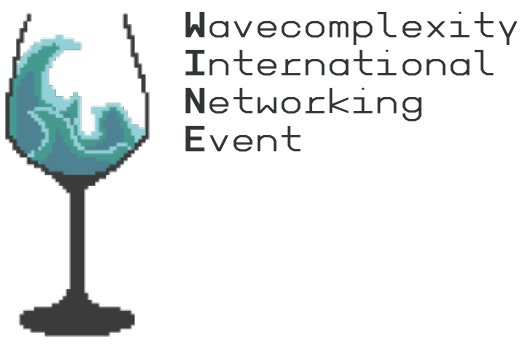WINE
Networking is a core component of scientific research. The current situation is strongly impacting networking and in particular it very strongly hinders the construction of new networks around early career researchers. Nowadays “traditional” online conferences allow for rapid and efficient diffusion of new knowledge but only moderately enable actual exchange and direct interaction. The Wavecomplexity initiative addresses this issue by organizing WINE: an online event explicitely oriented towards direct interaction and encouraging early career researchers involvement
WINE?
This is going to be the Wavecomplexity International Networking Event.
When and where:
- 1st - 2nd july 2021
- We will use gather.town to foster small group interactions and informal discussion. Here is a basic overview on how that works.
The space is now open to all:
The meeting space is open and fully functional without password or registration. Just follow this link towards the Wine in Nice gather space. Please try to apply the rules we set for the event: use your real name and keep video on whenever you enter the space.
Schedule
All times are CET, aka Côte d’Azur Time.
- Wednesday 30th june: meeting space opens. Use that time to get familiar with the system and see posters around (and meet people!)
- 1st july:
- 13:30 formal meeting opens
- 14:00 welcome
- 14:15 plenary talk: Sébastien Galtier
- 15:15 - 17:15 “Official” poster session
- 2nd july:
- 9:30 space is open
- 13:45 formal meeting starts
- 14:15 plenary talk: Gabriel Mindlin
- 15:15 - 17:15 “Official” poster session
Tracks:
- Photonic Phase Transitions
- Waves and Turbulence in Space Plasmas, Planetary Atmospheres and Oceans
- Waves in Complex Systems
- Mathematical and Computational Aspects of Wave Science
- Waves, Vortices and Turbulence in Quantum Fluids
Plenary speakers:
Sébastien Galtier (Université Paris-Saclay): Gravitational wave turbulence
The direct observation of gravitational waves (GW) (Abbott+, PRL, 2016) a century after their prediction by A. Einstein, is one of the most important events in astronomy. Unlike photons, GW are not expected to be affected by the opacity of the early universe, and therefore have the potential to provide a wealth of observational data on this primordial phase. But do we know what happened if the early universe was filled with a sea of GW? A plausible answer is given by the theory of weak wave turbulence. In this talk, I will introduce basic concepts of turbulence and some theoretical predictions. I will also show the first direct numerical simulations of weak GW turbulence. Finally, I will discuss about the plausible link between wave turbulence and cosmological inflation.
Gabriel Mindlin (Universidad de Buenos Aires): Synthetic Birdsongs as a Tool to Induce, and Iisten to, Replay Activity in Sleeping Birds
Birdsong is a complex vocal behavior, which emerges out of the interaction between a nervous system and a highly nonlinear vocal device, the syrinx. In this talk I will discuss how low dimensional dynamical systems, interpretable in terms of the biomechanics involved, are capable of synthesizing realistic songs. I will review the experimental and conceptual steps that lead to the formulation of low dimensional dynamical systems for the song system and describe the tests that quantify their success. In particular, I will discuss how to evaluate computational models by comparing the responses of highly selective neurons to the bird’s own song and to synthetic copies generated mathematically. Beyond testing the hypothesis behind the model’s construction, these low dimensional models allow designing precise stimuli in order to explore the sensorimotor integration of acoustic signals. Moreover, since during sleep, vocal muscles do get activated, we will show how to use our models to listen to a bird’s dream.
Participants:
The current status is of about 80 poster contributions. See also the current list of participants (updated from time to time). Please get in touch with the track organizers if you are interested, your participation is most certainely welcome.
Organization:
The event was prepared collaboratively by all track organizers. In addition, the wavecomplexity initiative wishes to thank Gianni Aupetit-Diallo for his very precious help with the technological setup.

